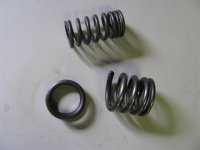Bolisk
Well-known member
My 1970 350/350 has a misfire (so I've been told by very experienced corvette shop) and it is most noticeable (engine rattles a bit) between 1,500 and 2,000 RPM.
I'm pretty sure it's on the right (passenger side) bank. Don't know which cylinder(s) yet. I was going to have a compression / leak down test preformed in the near future.
I've already replaced the plugs, cap, and rotor. I've recently changed the points to electronic, and the coil out approximately three years ago.
I do know that the valve guides were nureled (sp?) during the last rebuild approx 10,000 miles ago. (previous owner).
Just wondering what the causes are for misfire?
-Bolisk
I'm pretty sure it's on the right (passenger side) bank. Don't know which cylinder(s) yet. I was going to have a compression / leak down test preformed in the near future.
I've already replaced the plugs, cap, and rotor. I've recently changed the points to electronic, and the coil out approximately three years ago.
I do know that the valve guides were nureled (sp?) during the last rebuild approx 10,000 miles ago. (previous owner).
Just wondering what the causes are for misfire?
-Bolisk









